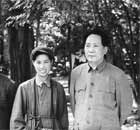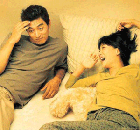-
-
China Daily E-paper
Web Comments
Imagine Western culture with Chinese characteristics
By Linda Gibson (chinadaily.com.cn)
Updated: 2010-02-04 10:32
 |
Large Medium Small |
It could happen. In fact, it’s likely to happen to some extent as long as China sticks to its opening-up policy.
China Daily commentator Zhu Yuan defended that policy recently after writer Mo Luo attacked it.
Mo, a scholar at the Chinese National Academy of Arts, says in his book “China Stands Up” that Western ways contaminate, exploit and weaken the Middle Kingdom. Zhu argued that China already has benefited from contact with Western cultures and will gain more if it carefully chooses which foreign characteristics take hold here.
| ||||
While China remained closed off, few of its people, products or ideas could make their way into the rest of the world. When the country opened up, the rest of the world rushed in as quickly as Nature moves to correct any sort of imbalance.
Naturally, this must have felt to China like a deluge, and some Chinese feared being swamped by alien ways.
But China will change the world as much as the world changes China, if the country continues its opening up.
How could it not? The rest of the world cannot remain unaffected by the culture of one-fifth of humanity. As China strengthens its economy, allows its citizens more overseas travel and participates in global efforts, the West inevitably will learn more about Chinese ways.
And once it does, its people might choose to adopt some of them.
It might surprise Chinese that Westerners know little about China. When I announced my Beijing job to American friends, family and neighbors, they were intensely curious and mostly uninformed about China.
Our media carries little news about China except during unusual circumstances, which typically are times of stress between the two countries. We hear about arguments with China over climate change, Taiwan and Tibet, but that doesn’t tell average Americans anything about average Chinese.
Most Americans don’t know that Chinese weddings feature firecrackers; that Chinese parents make extraordinary sacrifices for their children; that Chinese diners eat off of plates smaller than any on a Western table; that favorite Chinese beverages include hot soy milk and the potent white-grain alcohol, baijiu; that Chinese toddlers wear split pants instead of diapers; and that elderly Chinese sometimes walk down streets backwards to keep their balancing skills sharp.
Westerners will learn as they and the Chinese increasingly mingle. As they do, there’s no telling which Chinese customs will take root in foreign soil, but some of them surely will.
Maybe we’ll see baijiu and green tea served at baseball stadiums along with beer and soda pop. That wouldn’t make the game any less American.
Meanwhile, I hope China continues to take in what the world has to offer and transform it into something distinctly Chinese. To think that exposure to Western ways weakens China, instead of strengthens it, assumes the country’s culture is fragile. That’s a surprising attitude for any Chinese to take.










